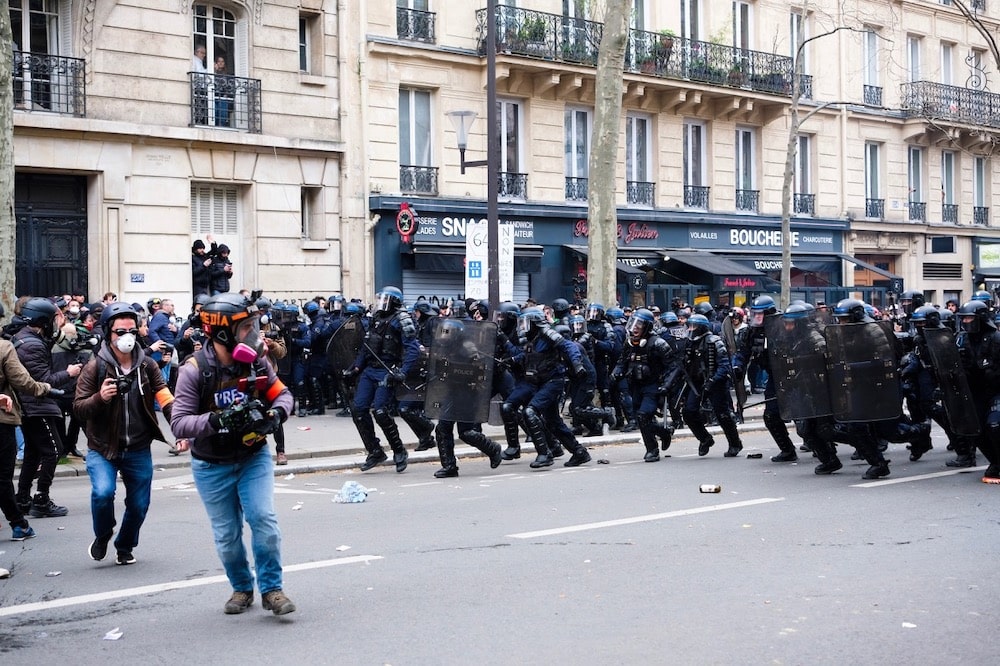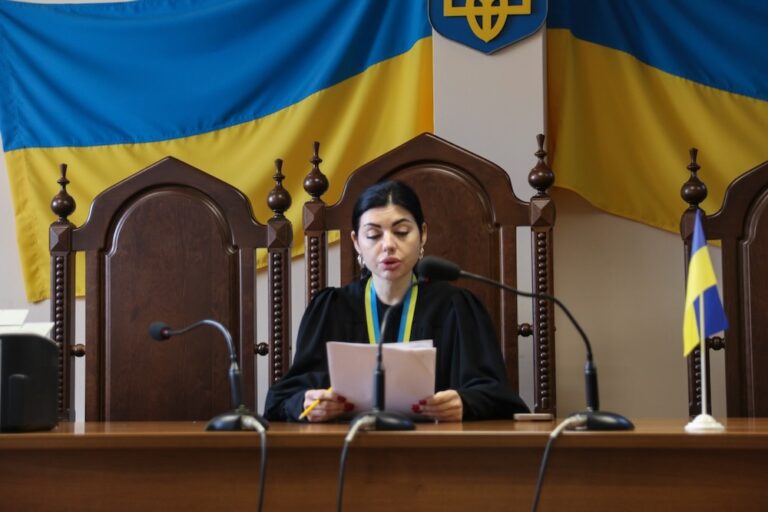March 2023 in Europe and Central Asia: A free expression round up produced by IFEX's Regional Editor Cathal Sheerin, based on IFEX member reports and news from the region.
Police beat protesters and journalists in France; “foreign agents” bill dropped in Georgia; legal restrictions on war reporting tightened in Russia; Belarusian Association of Journalists designated as an “extremist organisation”; censorship monitor censored in Turkey; defamation re-criminalised and a “foreign agents” bill in Republika Srpska.
“We have broken elbows and faces”
In France, March saw millions of people take to the streets to protest President Macron’s unpopular pension law reform, which raises the age of retirement from 62 to 64 years old, and which was forced through parliament using special constitutional powers.
While most of these demonstrations were peaceful, there were also incidents of vandalism and police brutality reminiscent of the 2018 gilets jaunes protests. Several hundred people were arrested: according to official figures, 24 March alone saw 457 arrests and 441 police officers injured.
Also on 24 March, the newspaper Le Monde reported that it had received an audio recording of officers threatening a group of young people they had arrested, boasting that they had “broken elbows and faces” of protesters.
Although the level of riot police violence was not as extreme as that which shook France in 2018, it was shocking enough for several human rights experts to raise their concerns about the actions of those responsible for ensuring law and order.
Human Rights Watch (HRW) reminded the French authorities to respect the right to protest and called for investigations into reports of police abuses. Reporters Without Borders (RSF), which documented several incidents where the police had attacked journalists, called on the authorities to end the violence against the press. According to RSF, police officers had beaten journalists with batons, thrown them to the ground and fired tear gas grenades directly at them.
The Council of Europe’s Commissioner for Human Rights, Dunja Mijatović, said that the police had used “excessive force” in response to the protests. She also said that “sporadic acts of violence” by some protesters “cannot justify excessive use of force by agents of the state”, and that such “sporadic acts” were not “enough to deprive peaceful protesters of their right to freedom of assembly”.
“Foreign agents” bill dropped
March also saw powerful protests in Georgia against a draft law on “foreign agents” that required organisations receiving over 20% of their income from a “foreign power” to register on a “Foreign Influence Agents Registry”. The bill – criticised as an attempt to suppress civil society and independent media – was widely condemned by the EU, regional and international CSOs and the media. It led to fist fights between lawmakers in parliament and also to thousands of citizens taking to the streets of the capital, Tbilisi, to make their opposition to the bill known.
After two nights of protests and police tear gas, the government announced it would drop the bill.
Following Russia’s bad example
Lawmakers in Republika Srpska (RS) – one of the two semi-autonomous entities of Bosnia and Herzegovina – appear to be following Russia’s bad legislative example (set a decade ago) on defamation, so-called “foreign agents” and LGBTQI+.
On 23 March, the National Assembly voted to re-criminalise defamation. Those convicted will now face fines of up to 25,000 euros, depending on how and where the offence is committed. The bill was strongly criticised by IFEX members as enabling the “unjustified prosecution of journalists, members of civil society or organisations reporting on corruption and other public interest matters”. There will be a 60-day public consultation period before the final adoption of the law.
Also on 23 March, the government adopted a draft law (similar to Russia’s “foreign agents” legislation) that would require non-profit organisations funded from abroad to register and report on their activities. The bill will now be debated in the National Assembly.
In Banja Luka (the largest city in RS), several dozen unidentified individuals attacked a group of journalists and LGBTQI+ activists as they were leaving an LGBTQI+ meeting on 18 March. The attackers used sticks and bottles during the assault, leaving the journalists in need of medical treatment; police who were nearby did not intervene. A local journalists’ association said that RS’s president, Milorad Dodik, bore responsibility for the attack due to the hostile environment fostered by his anti-press, anti-LGBTQI+ rhetoric.
Commenting after the attack, Dodik said that RS would soon pass legislation restricting rights for LGBTQI+ people:
“In the next few months, RS will pass a law in which members of LGBT organisations will be prohibited from entering educational institutions. So, they won’t be able to work, they won’t be able to approach kindergartens, schools, and colleges, and they won’t be able to do propaganda.”
At the end of the month, the European Broadcasting Union, the European Federation of Journalists (EFJ), and the South East Europe Media Organisation (SEEMO) called on the authorities in Bosnia and Herzegovina to take immediate action to address the deteriorating media situation in the country.
Legal restrictions on war reporting expanded
The Independent International Commission of Inquiry on Ukraine reported to the Human Rights Council in March, saying that Russia’s troops had committed a wide variety of rights violations during their occupation of Ukraine, many of which are war crimes. These included “wilful killings, attacks on civilians, unlawful confinement, torture, rape, and forced transfers and deportations of children”.
Separately, the International Criminal Court (ICC) issued arrest warrants for President Putin and his Children’s Rights Commissioner Maria Alekseyevna Lvova-Belova for their alleged involvement in the forced transfer and deportation of children. HRW provides a useful Q&A on this and the justice response to Russia’s invasion of Ukraine.
Russia expanded its legal restrictions on war reporting this month by extending the ban on disseminating “false” information about or “discrediting” the Russian army, to include organisations and individuals who support Russia’s invasion, such as the mercenary group Wagner. The legislation was adopted by the State Duma on 15 March, and, when enacted, it will increase penalties for those convicted, raising the maximum sentence from three to five years in prison. On 6 March, under the original version of this law, journalist Andrey Novashov was sentenced to eight months of correctional labour and a one-year ban on journalistic activities.
Towards the end of the month, Russia’s security services arrested Wall Street Journal reporter and US citizen Evan Gershkovich on dubious espionage charges. He is being held in pre-trial custody until 29 May and faces a very lengthy prison sentence if convicted. The Committee to Protect Journalists, the EFJ, HRW and the International Press Institute called for his immediate release.
BAJ designated as an “extremist organisation”
March was another month of draconian prison sentences and persistent pressure on civil society in Belarus. Regional IFEX member the Belarusian Association of Journalists (BAJ) was designated as an “extremist organisation” by the authorities, a decision that was condemned by IFEX members and the OSCE Representative on Freedom of the Media, Teresa Ribeiro. BAJ joins more than 100 CSOs and media outlets on Belarus’s list of “extremist” groups.
Following on from February’s harsh sentencing of independent voices, exiled opposition leader Sviatlana Tsikhanouskaya was convicted in absentia of treason and “conspiracy to seize power”; she was sentenced to 15 years in prison.
Later in the month, TUT.BY editor-in-chief, Maryna Zolatava, and the media outlet’s CEO, Ludmila Chekina, were both handed prison sentences of 12 years. Valeryia Kastsiuhova, founder and editor of website Nashe Mneniye, was sentenced to 10 years in prison.
March also saw the UN High Commissioner for Human Rights report to the Human Rights Council on the situation in Belarus since May 2020. The report concluded that between 1 May 2020 and 31 December 2022, there were “reasonable grounds to believe” that several human rights violations were committed, including “arbitrary deprivation of the right to life and to liberty, torture and ill-treatment, including sexual violence, denial of the rights to due process and to a fair trial, arbitrary denial of the right to enter one’s own country, violations of the rights to freedom of expression, peaceful assembly and association and to equal protection of the law”. Some of these violations, the Commissioner said, “may also amount to crimes against humanity”. The report calls for the release of all political prisoners and for an end to the systematic repression of critical voices.
On 23 March, 38 OSCE participating states invoked the Moscow Mechanism over the Lukashenka regime’s “alleged human rights violations”. This provides the opportunity for participating states to send missions of experts to investigate human rights and democracy-related problems in another state. It was last invoked in relation to Belarus in September 2020.
Censoring the censorship monitor
In Turkey, the government’s authoritarian response to February’s devastating earthquakes continues to impact journalists, social media users and ordinary citizens.
March saw journalist Fırat Bulut arrested in Ankara after he’d returned from spending one month reporting on the earthquake in Malatya province; he was accused of spreading false information about the earthquakes under Turkey’s new “disinformation” law.
Days earlier, in a separate case, judges ordered the removal of two articles from two media outlets (daily newspaper BirGün and news agency ANKA) that questioned the government’s handling of the aftermath of the earthquakes.
The authorities continued to target individuals for their earthquake-related social media posts. By mid-March, police had initiated legal action against 730 social media users and had arrested 43.
Many journalists and press freedom advocates fear a clampdown on media as Turkey heads towards a general election in May. March saw numerous events that fuelled that fear, including: the announced closure of Deutsche Welle’s Turkey office after the government refused to extend its operating licence; and the blocking of access to the EngelliWeb platform, which, ironically, monitors internet censorship in Turkey.



